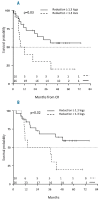A sequential approach with imatinib, chemotherapy and transplant for adult Ph+ acute lymphoblastic leukemia: final results of the GIMEMA LAL 0904 study
- PMID: 27515250
- PMCID: PMC5479612
- DOI: 10.3324/haematol.2016.144535
A sequential approach with imatinib, chemotherapy and transplant for adult Ph+ acute lymphoblastic leukemia: final results of the GIMEMA LAL 0904 study
Abstract
In the GIMEMA LAL 0904 protocol, adult Philadelphia positive acute lymphoblastic leukemia patients were treated with chemotherapy for induction and consolidation, followed by maintenance with imatinib. The protocol was subsequently amended and imatinib was incorporated in the induction and post-remission phase together with chemotherapy. Due to the toxicity of this combined approach, the protocol was further amended to a sequential scheme based on imatinib plus steroids as induction, followed by consolidation with chemotherapy plus imatinib and, when applicable, by a hematopoietic stem cell transplant. Fifty-one patients (median age 45.9 years) were enrolled in the final sequential protocol. At the end of induction (day +50), 96% of evaluable patients (n=49) achieved a complete hematologic remission; after consolidation, all were in complete hematologic remission. No deaths in induction were recorded. Overall survival and disease-free survival at 60 months are 48.8% and 45.8%, respectively. At day +50 (end of imatinib induction), a more than 1.3 log-reduction of BCR-ABL1 levels was associated with a significantly longer disease-free survival (55.6%, 95%CI: 39.0-79.3 vs. 20%, 95%CI: 5.8-69.1; P=0.03), overall survival (59.1%, 95%CI: 42.3-82.6 vs. 20%, 95%CI: 5.8-69.1; P=0.02) and lower incidence of relapse (20.5%, 95%CI: 7.2-38.6 vs. 60.0%, 95%CI: 21.6-84.3; P=0.01). Mean BCR-ABL1 levels remained significantly higher in patients who subsequently relapsed. Finally, BCR-ABL1p190 patients showed a significantly faster molecular response than BCR-ABL1p210 patients (P=0.023). Though the study was not powered to evaluate the role of allogeneic stem cell transplant, allografting positively impacted on both overall and disease-free survival. In conclusion, a sequential approach with imatinib alone in induction, consolidated by chemotherapy plus imatinib followed by a stem cell transplant is a feasible, well-tolerated and effective strategy for adult Philadelphia positive acute lymphoblastic leukemia, leading to the best long-term survival rates so far reported. (clinicaltrials.gov identifier: 00458848).
Trial registration: ClinicalTrials.gov NCT00458848.
Copyright© Ferrata Storti Foundation.
Figures





Similar articles
-
[Molecular response and prognostic factors of patients with Philadelphia chromosome/BCR-ABL-positive acute lymphoblastic leukemia treated by imatinib with chemotherapy].Zhonghua Xue Ye Xue Za Zhi. 2014 Feb;35(2):120-5. doi: 10.3760/cma.j.issn.0253-2727.2014.02.013. Zhonghua Xue Ye Xue Za Zhi. 2014. PMID: 24606652 Chinese.
-
Ponatinib vs Imatinib in Frontline Philadelphia Chromosome-Positive Acute Lymphoblastic Leukemia: A Randomized Clinical Trial.JAMA. 2024 Jun 4;331(21):1814-1823. doi: 10.1001/jama.2024.4783. JAMA. 2024. PMID: 38722621 Free PMC article. Clinical Trial.
-
Final analysis of the JALSG Ph+ALL202 study: tyrosine kinase inhibitor-combined chemotherapy for Ph+ALL.Ann Hematol. 2018 Sep;97(9):1535-1545. doi: 10.1007/s00277-018-3323-8. Epub 2018 Apr 24. Ann Hematol. 2018. PMID: 29694642 Free PMC article.
-
Advances in therapy for Philadelphia-positive acute lymphoblastic leukaemia of childhood and adolescence.Br J Haematol. 2016 Mar;172(6):855-69. doi: 10.1111/bjh.13896. Epub 2016 Jan 15. Br J Haematol. 2016. PMID: 26773444 Review.
-
Philadelphia chromosome-positive acute lymphoblastic leukemia in adults: current treatments and future perspectives.Clin Adv Hematol Oncol. 2018 Mar;16(3):216-223. Clin Adv Hematol Oncol. 2018. PMID: 29742077 Review.
Cited by
-
Digital PCR: A Reliable Tool for Analyzing and Monitoring Hematologic Malignancies.Int J Mol Sci. 2020 Apr 29;21(9):3141. doi: 10.3390/ijms21093141. Int J Mol Sci. 2020. PMID: 32365599 Free PMC article. Review.
-
Comparison of microtransplantation, chemotherapy and allogeneic transplantation in post-remission therapy for Philadelphia chromosome-positive acute lymphoblastic leukemia.Am J Cancer Res. 2020 Nov 1;10(11):3852-3866. eCollection 2020. Am J Cancer Res. 2020. PMID: 33294272 Free PMC article.
-
Targeting the STAT5 pathway in Ph+ acute lymphoblastic leukemia.Oncotarget. 2018 Dec 4;9(95):36726-36727. doi: 10.18632/oncotarget.26412. eCollection 2018 Dec 4. Oncotarget. 2018. PMID: 30613358 Free PMC article. No abstract available.
-
[Efficacy of Hyper-CVAD/MA and CHALL-01 regimens in the treatment of Philadelphia chromosome-positive adult acute lymphoblastic leukemia patients under 60 years old].Zhonghua Xue Ye Xue Za Zhi. 2019 Aug 14;40(8):625-632. doi: 10.3760/cma.j.issn.0253-2727.2019.08.001. Zhonghua Xue Ye Xue Za Zhi. 2019. PMID: 31495127 Free PMC article. Chinese.
-
Ponatinib, chemotherapy, and transplant in adults with Philadelphia chromosome-positive acute lymphoblastic leukemia.Blood Adv. 2022 Sep 27;6(18):5395-5402. doi: 10.1182/bloodadvances.2022007764. Blood Adv. 2022. PMID: 35675590 Free PMC article.
References
-
- Mancini M, Scappaticci D, Cimino G, et al. A comprehensive genetic classification of adult acute lymphoblastic leukemia (ALL): analysis of the GIMEMA 0496 protocol. Blood. 2005;105(9):3434–3441. - PubMed
-
- Moorman AV, Harrison CJ, Buck GA, et al. Karyotype is an independent prognostic factor in adult acute lymphoblastic leukemia (ALL): analysis of cytogenetic data from patients treated on the Medical Research Council (MRC) UKALLXII/Eastern Cooperative Oncology Group (ECOG) 2993 trial. Blood. 2007; 109(8):3189–3197. - PubMed
-
- Burmeister T, Schwartz S, Bartram CR, et al. Patients’ age and BCR–ABL frequency in adult B-precursor ALL: a retrospective analysis from the GMALL study group. Blood. 2008;112(3):918–919. - PubMed
-
- Thomas DA, Faderl S, Cortes J, et al. Treatment of Philadelphia chromosome-positive acute lymphocytic leukemia with hyper-CVAD and imatinib mesylate. Blood. 2004;103(12):4396–4407. - PubMed
Publication types
MeSH terms
Substances
Associated data
LinkOut - more resources
Full Text Sources
Other Literature Sources
Medical
Miscellaneous

